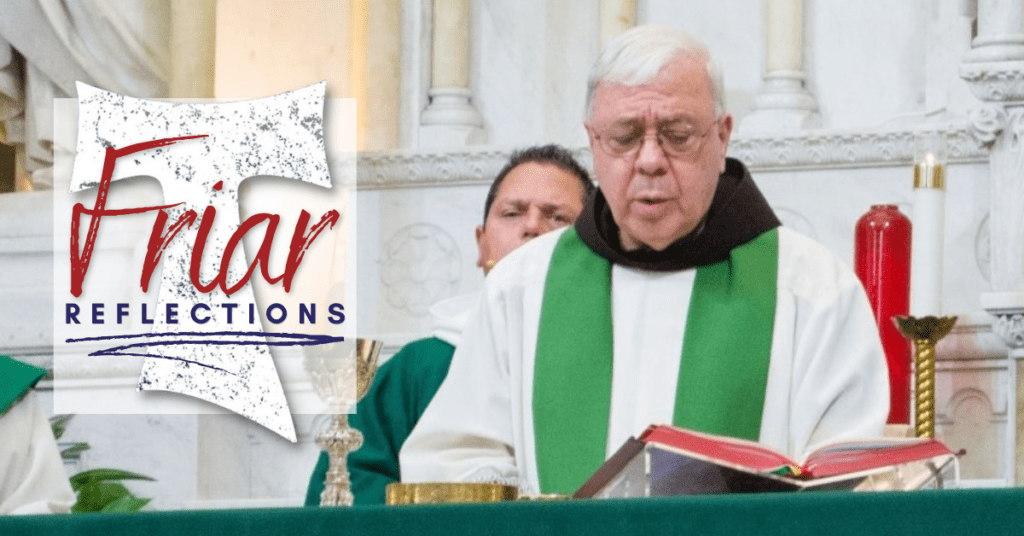
(Editors Note: Embarking on a new tradition in 2022, the friars of Sacred Heart will alternate penning a letter or discussion aimed to help parishioners engage with the readings, the parish, or their outreach initiatives on a weekly basis. This new practice continues with a letter from Fr. Ron Gliatta discussing two challenges Jesus sets before us in our readings this week, and how they impact preparations for Lent.)
- Readings for The Eighth Sunday in Ordinary Time
Dear Sacred Heart Parishioners,
Our Gospel reading for this weekend presents a very daunting challenge to us as followers of Jesus Christ. The basic challenge before us centers upon two essential questions that Jesus places before his disciples and us: Do I stand in judgement of others? -and- Am I quick to notice what others do wrong, but not so quick to recognize the same faults and failings, or even worse, in myself?
These questions, my dear friends, presented to us for our reflection, offer a unique opportunity for self examination, contemplation and meditation as we approach the holy season of Lent.
Jesus makes clear to his followers, “do not judge.” What a difficult command! How many times have we stood in judgement of others, sometimes unconsciously? If we notice someone in a shopping mall who may look different than us, or finding out that our neighbor aligns with a different belief or ideology Without context or knowledge or discussion, how often have we already made judgements in our hearts? Do we make allowances for people’s differences or weakness and resist the temptation to quickly judge?
Often we pray for clear vision, and not to rashly judge others. We pray to possess the ability to see clearly enough to recognize our own weakness so that we may have compassion and not be so quick to criticize the weaknesses of others. Then, all to often, the temptation to stand in judgement over others becomes too difficult for us to resist.
My dear brothers and sisters, Jesus calls us to a holier state of life. He calls us to be more compassionate, more understanding, and certainly more loving and charitable towards our neighbor.
“Who am I to judge?” must rank as one of the best known phrases of our holy father, Pope Francis. Perhaps that is because it touches upon a very sensitive point in our pluralistic society. What rights have we to stand in judgement of others’ behaviors or beliefs? Attempting to do so can easily degenerate into a passive, uncaring attitude towards others. Scripture tells us “who of us can know the mind of God?” That in the final analysis, it is God and God alone who is the final judge of us all.
Thus, Jesus invites us to “…first remove the beam from our own eyes that when we then can see clearly enough to remove the splinter from out sisters’ or our brothers’ eye.” This Sunday’s gospel reading then is a perfect segue to our celebration of Ash Wednesday and the beginning of our Lenten season.
My dear friends, our preparations for this holy season of Lent should not only consist of fasting and prayer, but also our own works of humility and charity. As we ask our Lord for mercy and forgiveness, not only toward ourselves but also towards those whose opinions and behaviors we may find difficult to accept, we should seek out God’s mercy and forgiveness for those times we have not treated others with understanding, kindness, charity or love.
As we approach the season of Lent, we should look to the Holy Spirit for guidance in making sound judgements that bend toward treating our neighbor with fairness and humility. Let us ask God that we may do so with a sense of peace and calm, learning how we might become more loving, tolerant, and charitable in our attitude towards one another.
It is my hope and prayer that this reflection will help to serve as a reminder to all of us of the importance of the holy season of Lent, and to use this time wisely in our spiritual preparation for the celebration of Easter this year. May God, who has begun this good work in each and every one of us, see it to fulfillment in the kingdom of Heaven.
Pax et bonum,
Fr. Ron
In the drop down menu below, you’ll find an additional resource discussing the power of Lent, and how it relates to judgement.
The Power of Lent by Kathy Kuczka
The day before Ash Wednesday, and in some locales several days prior, people don beads and masks to celebrate with parties, parades, and pageantry. Called “Carnival” or “Mardi Gras” (French for “Fat Tuesday”), the Tuesday before Ash Wednesday is the climax of the merrymaking. The day has also been known as Shrove Tuesday.
The word shrove comes from an old English word that means “to prescribe or impose” – namely a penance. Shrove Tuesday was celebrated to anticipate the penance and fasting of Lent by emptying out refrigerators and pantries to make pancakes and other delights that would use up foods prior to Lent. Anyone who has celebrated Carnival or Mardi Gras has likely donned a mask. Whether it covers just the eyes or the whole face, a mask invites a sense of mystery that can add an extra dose of fun to the festivities. At first, people who were on the margins wore masks to escape judgment. Masked, they felt free to be whoever they wanted to be. They could go where they wanted and mingle with whomever they wanted, including the upper class. Carnival is not the only time masks are worn. People regularly wear invisible masks, often for the same reason as the early revelers—to avoid the judgment of others, to escape pain, to belong.
Lent is a season that empowers Christians to remove their masks and discover who they are. Jesus showed how to do this. During his forty-day sojourn in the desert, Jesus was tempted to put on the masks of superiority, power, and control. He chose instead to trust in God. During Lent, we too are called to enter a desert experience, to bare ourselves, and to remove the masks that hide who we are. May we, like Jesus, choose instead to trust in God and discover in ourselves a reflection of the God who loves us just as we are.
(Taken from “Connecting the Liturgy with our Lives” by Kathy Kuczka)




